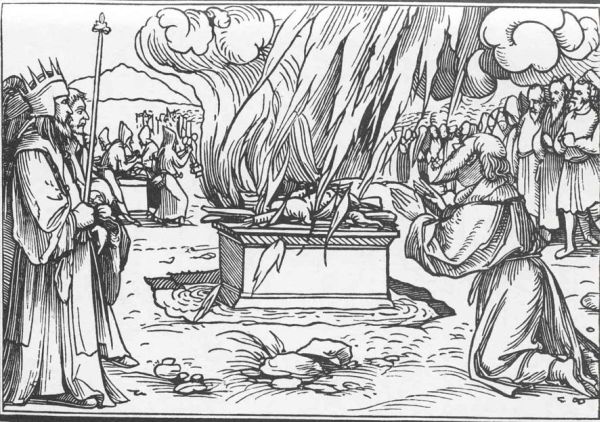When Overcome by Fear — Don’t Flee!

Fear can cause all kinds of reactions and impulses in us depending on the circumstances. Many will flee, while others may just stand still, like a deer in an approaching vehicle’s headlights. Some will not think or act rationally and might even aid that which is creating fear in the first place. Fear in itself is not necessarily wrong, such as fear of a vicious dog running toward us, or of being in an open area with a severe storm approaching.
The problem comes when we are living in a state of fear.
The Bible says, “There is no fear in love; but perfect [godly] love casteth out fear: because fear hath torment. He that feareth is not made perfect in love” (1 John 4:18). One might think that just because someone is a godly individual, they have completely overcome fear, but that is usually not the case.

Elijah Boldly Proved That God is a Living God
There was a prophet named Elijah in the book of First Kings in the Old Testament. He had just proven before the Israelites that God is a living god and had put to shame the prophets of Baal, who found out that their ‘god’ was lifeless, having no power or authority. As a result, these false prophets were slain. He then sought God to bring rain back upon the drought-stricken land of Israel. All of this was done in the presence of Ahab, the king of Israel. He had seen the hand of God make a mockery of the priests of Baal, and was actually riding in his chariot as the rain fell in abundance.
Yet all Ahab could do in return was to emphasize the death of the prophets of Baal in his report of Elijah’s actions to his wife Jezebel (one of the most wicked people in history). Naturally, this did not set well with her. “Then Jezebel sent a messenger unto Elijah, saying, So let the gods do to me, and more also, if I make not thy life as the life of one of them by to morrow about this time” (1 Kings 19:2).
Elijah Feared Jezebel and Fled
You would think that, after all that had just occurred, Elijah would have stood up to her empty threats in the name of God. “And when he saw that, he arose, and went for his life, and came to Beersheba, which belongeth to Judah, and left his servant there. But he himself went a day’s journey into the wilderness, and came and sat down under a juniper tree: and he requested for himself that he might die; and said, It is enough; now, O Lord, take away my life; for I am not better than my fathers” (1 Kings 19:2-4).
Instead of seeking God, like he had done during the challenge to the prophets of Baal, and bringing rain upon the land, Elijah let his fear of Jezebel get the best of him and he ran away from the situation. Some say he ran as much as 180 miles!

Elijah Could Not Flee From God
But he still did not outrun or escape God. “And he came thither unto a cave, and lodged there; and, behold, the word of the Lord came to him, and He said unto him, What doest thou here, Elijah?” (1 Kings 19:9) God let him know that he was out of place in His plans. Elijah thought he was justified in fleeing, and he ultimately felt that he was the only prophet left in the whole region (or even the whole world!). How often we listen solely to our own mind for wisdom and advice.
Through Elijah, we can see how even a prophet of God will fall prey to fear when he takes his eyes off of God and looks to self instead.
Godly Love is the Answer
As stated earlier, “there is no fear in love.” When we let go of God’s hand in our self-confidence, we find that fear is quick to take its place, which will often result in irrational behavior. “He that feareth is not made perfect in love.” The key for us here is to maintain a steadfast relationship with God through His Son Jesus, where perfect (godly) love is found. When we focus on Christ, we rest in the shadow of the cross and fear will not enter in.

When we become distracted, we let our relationship slip, especially concerning our self or the cares of this world. We can’t let fear take us over to the point where we think running away is the best thing to do. The Apostle Paul said, “Wherefore take unto you the whole armour of God, that ye may be able to withstand in the evil day, and having done all, to stand.” (Ephesians 6:13).
When the devil brings about a situation of fear, we are not to run or fight; we are to simply stand and hold our ground.
Fear Should Not Replace God
How often our fears are not legitimate but just empty threats. Yet we still resort to looking to our own self for the answer. Many times we go to extremes to evade fear and windup up out of the plan of God for our life. But in the end, we finally realize that we can never outrun God. This is actually good, because we have the assurance that He will be there for us when we finally give up and turn to Him for help. Our goal should be to turn our fear over to God at the outset. We should never reach the place where God has to ask, “What are you doing here?”
[Additional image credits: Featured image (when applicable) by ErikaWittlieb from Pixabay; Opening image by MART PRODUCTION on Pexels]




